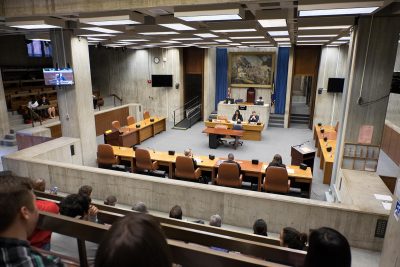
The Boston City Council Committee held a hearing Tuesday regarding the status of LGBT youth of color in the City of Boston.
The Committee on Healthy Women, Families, and Communities invited representatives from Boston Public Schools, the Boston Public Health Commission and The Fenway Institute, as well as other interested organizations and individuals to testify in the hearing at Boston City Hall.
City Councilor Josh Zakim, who was the maker of the hearing order, said in his opening remarks that the idea for the hearing came from meetings with various advocacy organizations in Boston and in finding the needs “of a very vulnerable and often under-the-radar population in the City of Boston.”
“We always talk about Boston being a welcoming, progressive, open city. It’s important that we put our money where our mouth is,” Zakim said during the hearing. “When there is a problem that’s not being addressed adequately, we want to bring people together … to learn about the needs and also raise awareness [about the LGBT youth community].”
Sara Conran, an investigator at The Fenway Institute, recently researched the status of LGBT youth of color in Boston. She and other researchers from the Institute surveyed LGBT youth of color and found that 40 percent reported symptoms of depression and/or anxiety, and that one in five reported exchanging sex for a place to sleep, money, food or drugs in the prior three months.
“Let’s make Boston a place of action and compassion, and work together to change these patterns,” Conran said during the hearing. “We can help all youth and realize their potential.”
The Fenway Institute’s research has revealed that LGBT pride and racial pride are associated with a reduced risk of mental health disparities among this population of youth.
The hearing, held at 11 a.m. on Tuesday, was originally set to be held at 3:00 p.m. Conran said that many of the youth and adults that wanted to testify were unable because of the time change.
“Just know we are a small segment of the group that cares a tremendous amount about LGBTQ youth of color,” Conran said.
LGBT youth experience high rates of victimization, suicide risks, substance abuse, homelessness and HIV infection. Among this whole population, the risks that contribute to health disparities disproportionately affect youth of color, according to a document offered by Zakim at the hearing.
According to a report released this August by the Centers for Disease Control and Prevention, black LGBT men have a one in two chance of contracting HIV, the highest of any demographic studied. Latino LGBT men have a one in four chance, compared to white LGBT men who have a one in 11 chance of contracting HIV.
After the hearing, several attendees said they enjoyed the conversation and are hopeful this will inspire more people to assist LGBT youth in the community.
Eugenia Handler, a spokesperson at The Fenway Institute, said the most important part of the hearing was the opportunity for lesbian, gay and transgender members of the community to speak.
“[The speaker’s] comments were not only based on first-hand experiences which is powerful, but each of them also are quite educated, in terms of degree or one thing. I thought is a very unique kind of a combination in this hearing,” Handler said after the hearing. “[This hearing] will be the next important point for people like you and me and all of us to and again demonstrate their interest.”
Samantha Kreitman and Sarah Horn, both members of Greater Boston PFLAG, said they are glad they could have a hearing about issues LGBT youth of color have in Boston, but are hoping this population receives more attention outside of the hearing.
“I have to say, one of the things that I wish that happens is more accessible for the community that we are talking about to be present,” Kreitman said. “Today is Tuesday. It’s a school day. It’s getting attention, but we are not being found that population we want to target.”
Horn said the community finally had its day in City Hall.
“They are welcoming their community into the City Hall, but I think it will say something very powerful if you have public forum like this to get access after school to the community,” Horn said. “The LGBTQ youth and parents, to speak for themselves.”
